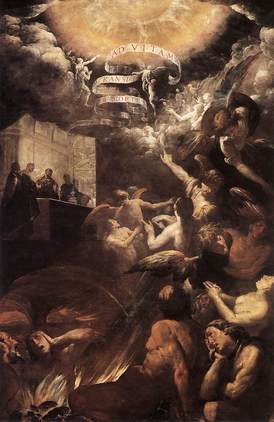Grant, O Lord, that Thy faithful may begin the solemn days of Lent with fitting piety and may persevere therein with steadfast devotion.
It is time to "begin the time of fasting with joy, submitting ourselves to spiritual struggle" in preparing to live fully the Paschal Mystery of the Lord (His saving life, death, resurrection and Ascension). "By the solemn forty days of Lent the Church unites herself each year to the mystery of Jesus in the desert." (Catechism of the Catholic Church 540).
 What is asked of those who make the claim to follow Christ? It seems to me that the path to understanding and living these 40 days of Lent in order to live the rest of the year as a true, honest, loving Christian. Lent, oddly enough, is a joyful time when we have a focused embrace of the spiritual struggle played out in acts of contrition, purification and prayerfulness. Often we hear Lent reduced to prayer, fasting and almsgiving. True enough, those are the hallmarks of Lent. But to broaden our sense of Lent let's think that there is time for fasting, abstinence from certain foods, ways of thinking, acting, speaking, simple living (frugality), restriction of personal desires, intense prayer, confession of sins, and similar ascetic elements are essential to the period of Lent. Lent is a time for good work on the soul and the heart (and the body if need be). No doubt if we take Lent seriously and actually do some these spiritual works, they may be burdensome obligations or unbearable duties. We may even feel a bit despondent or dejected. The spiritual fathers and mothers all tell us that to truly follow Christ with any degree of honesty we have to work on changing our lives by conforming the self to Christ, even if it hurts. How do know how conform the self to Christ? Do lectio divina (see entry 1 and entry 2), pray the rosary, go to confession, do charitable work, spend time in silence alone in personal prayer, adore Christ in the Blessed Sacrament, and go to
What is asked of those who make the claim to follow Christ? It seems to me that the path to understanding and living these 40 days of Lent in order to live the rest of the year as a true, honest, loving Christian. Lent, oddly enough, is a joyful time when we have a focused embrace of the spiritual struggle played out in acts of contrition, purification and prayerfulness. Often we hear Lent reduced to prayer, fasting and almsgiving. True enough, those are the hallmarks of Lent. But to broaden our sense of Lent let's think that there is time for fasting, abstinence from certain foods, ways of thinking, acting, speaking, simple living (frugality), restriction of personal desires, intense prayer, confession of sins, and similar ascetic elements are essential to the period of Lent. Lent is a time for good work on the soul and the heart (and the body if need be). No doubt if we take Lent seriously and actually do some these spiritual works, they may be burdensome obligations or unbearable duties. We may even feel a bit despondent or dejected. The spiritual fathers and mothers all tell us that to truly follow Christ with any degree of honesty we have to work on changing our lives by conforming the self to Christ, even if it hurts. How do know how conform the self to Christ? Do lectio divina (see entry 1 and entry 2), pray the rosary, go to confession, do charitable work, spend time in silence alone in personal prayer, adore Christ in the Blessed Sacrament, and go to
The liturgical season of Lent is 40 days -not a long period of spiritual training--and it ought to be regarded as an invaluable and divine gift from a God who loves us and wants us to be in relationship with Him. It is a sacred time of divine grace, which seeks to detach us from things material, lowly and corrupt in order to attract us toward things superior, wholesome and spiritual (see Catechism 1434-9). As one Christian leader said, "Lent is a unique opportunity to remove from the soul every passion, to rid the body of everything superfluous, harmful and mortal. Accordingly, then, it is a time of immense rejoicing and gladness. Lent is a genuine feast and time for exhilaration!"
Fasting expected of us by the Church, as well as the abstinence, frugality, restriction of personal desires and unnecessary pleasures or expenses, literally constitute a prescription for salvation. This is especially true this year, when our world has experienced a global economic crisis, filled with imminent danger of bankruptcy not only for individuals and companies, skyrocketing unemployment, the creation of entire hosts of people plagued by poverty, nihilism, depression, crime, and other societal ills. Lent is an education that labors to instruct us in a particular daily journey with not a great sense of "success," without the arrogance and entitlement of extravagance, waste and bravado. It encourages us to surrender all forms of greed and ignore the challenges of commercial advertising, which constantly promotes new and false necessities (see Catechism 1430-3).
The Lenten season provokes us to limit ourselves to what is absolutely essential and necessary in an attitude of dignified, deliberate simplicity. Christian leaders advise us not to be a consuming or compulsive herd of thoughtless and heartless individuals, but a culture of sensitive and caring persons, sharing with and supporting our "neighbor" that is in poverty or recession. Finally, Lent informs us about patience and tolerance in moments of smaller or larger deprivation, while simultaneously emphasizing the need to seek God's assistance and mercy, placing our complete trust in His affectionate providence.
That is how Christ envisions Lent. That is how the saints lived Lent. This is how the Church Fathers undertakes the struggle of Lent. This is how our faith has traditionally understood Great Lent. This is how the Church in


Leave a comment